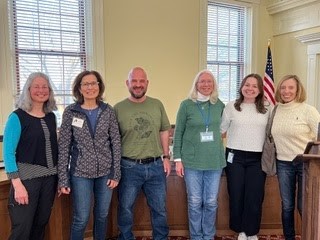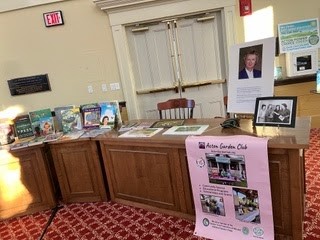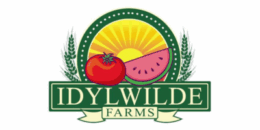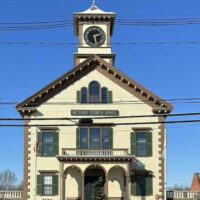Trevor Smith of Weston Nurseries wowed the one hundred-person audience at the Acton Town Hall (and on Zoom) on April 24 as he shared his wisdom in “Gardening for Resilience”. He helped audience members understand how we each can make an impact on climate change in our own backyards, as he shared his knowledge of landscaping for regeneration and resilience in the Annual Shirley Towle Lecture.
Smith’s optimism was reinforced by the energy and the synergy of three like-minded organizations that sponsored this lecture: the Acton Garden Club, Acton Conservation Trust, and Energize Acton, working in concert with the Acton Sustainability Office. They continue to bring the mandate to address climate change to our community.
If you missed it, the entire lecture was recorded. Contact energizeacton.org@gmail.com for more information.

According to data shared by Smith, New England is warming faster than the rest of the world and has warmed 3.29 degrees in the last 120 years, while the rest of the planet has warmed only 2.0 degrees. Smith said his call to action came during a 2021 Zoom meeting with colleagues from Tennessee and California who had been displaced after experiencing fires and floods in their hometowns. “We are all climate refugees in our own country now,” he said, noting that it’s not just tsunamis and volcanoes in faraway places, but fires, floods, tornados, and storms that impact us and our country daily. He presented an urgent call to focus on what we can do now, in our own space. He emphasized that we must start now and not wait for corporations, government, or other nations to save us, and that we can make an impact with simple modifications on our property, in our own spaces, which will add up to substantial change.
Smith said that through the art and science of regenerative landscaping, we must create ecosystems that benefit all. He emphasized a change in mindset from landscaping for beauty alone to examining the needs of our environment, repairing the damage, regenerating the landscape, and creating a new sustainability. According to Smith, gardening of the future will be more hands off. By improving our understanding of ecosystems and simplifying our methods –now complicated by lawns, fertilizers, and weed killers – we can step aside and let nature take charge.
He sees the world in three spheres: soil, water, and plants and animals, and he encouraged us to understand the importance of soil, keeping the water cycle, and maintaining biodiversity in plants and animals.
Soil
Smith commented that we walk on soil daily but rarely consider how precious it is. It is the answer beneath our feet. It is more than just “dirt,” he explained. It is a brilliant recipe of air, water, sand, silt, and clay. It is essential to the microbiota and ecosystems above and below the ground.
Soil is porous, containing 30% air. Without porosity, soil is compacted and unable to sequester carbon, absorb water, or support biodiversity.
Soil is permeable. Thirty percent of soil is water acquired during infiltration. Good soil prevents flooding. The organic matter in the soil can hold up to 25,000 gallons of water per acre–the amount that falls in one inch of rain over one hour. Soil is also a carbon sponge, pulling carbon from the air to feed the soil through the roots of the trees and to feed the microbiota below.
Smith presented the example of the effects of soil compaction from heavy equipment which can create up to three feet of a cement-like soil that does not absorb water and has no aeration, creating run off, erosion and flooding and virtually eliminating all the life in the soil.
Smith advises us to avoid compaction and restore the carbon sponge with trees, roots, and plants, allowing minerals to go back into the soil to feed the microbiota and the animals. If needed, he said, there are ways to reclaim soil by using a biologic brew of microbiota feasting on sugars of black molasses, quickly aging the soil.
Water
Smith explained that a warming climate has impacted the hydrologic cycle, accelerating evaporation into the atmosphere, which results in more intensified rainstorms that lead to flooding; compacts soil; harms forests, structures, and crops; and endangers cattle and humans.
The dynamics of the water cycle we knew so well – evaporation, sublimation, condensation, precipitation, run off, and infiltration – has changed, Smith explained. Less water flows through the soil as permeation decreases due to development and construction. Aging water systems are unable to handle the increased runoff. Rivers fill too fast and flooding occurs. Rising temperatures dry out soil, decrease infiltration, and bring drought and deforestation.
Smith encouraged mitigation of the impact that growth has had on runoff, infiltration, and permeation. He said that if gardeners improve the soil, water flow and retention, and “plant for nature,” insect and animal species will return. The plants you choose may save a species. Become a “species superhero” and plant the change you wish to see.
What’s the Future?
Smith closed his talk with a reference to Buckminster Fuller. “You never change things by fighting the existing reality. To change something, build a new model that makes the existing model obsolete.” He proposes that we create models. Show people it works, make it the rage. Decrease lawns, use lawn alternatives, plant native gardens, install green roofs, use permeable pavers. Smith is building models online at Weston Nurseries with seven garden starter formulas.
Acton will be building a new model as it makes plans for changes in the “Red House” next to Town Hall – a model of sustainability, inside and outside, with rain, shade, and pollinator gardens.
Smith left his audience with hope that there is a future and much to look forward to. Nature will be our guide, he said, and will let us know if we are doing a good job.
What can you do now?

1. Ask yourself: is grass really low maintenance, with fertilizer, upkeep, and mowing? Consider bigger garden beds, smaller lawns, and lawn alternatives such as woodland strawberry.
2. Do you really need fertilizer? More nitrogen? Or do you need a soil test to tell you what you need? Soil test kits are available at the Acton Memorial Library and at University of Massachusetts, as well as sold commercially.
3. Moss is green. Learn to love it! It loves acidic and moist soil. Consider changing your thinking or you will be investing a lot of time cutting grass and applying lime.
4. Avoid compaction. Don’t turn your soil into cement by parking your vehicles on your grass or on the roots of a tree that might border your property. Compaction leads to hard soil, low porosity and weeds such as crabgrass, which leads to weed killers that enter the water cycle and the fish we eat. Plan with lawn management and construction companies to protect the soil. Avoid irrigation the day before your landscaper rides over your lawn.
5. Consider leaf mulch. The soil, the plants, and the animals will love you.
Trevor Smith is a regenerative landscape professional designer and education manager at Weston Nurseries. He holds several landscape certifications including MCH, NOFA AOLCP, LEED GA, and IPC. He is also a past president of the Ecological Landscape Alliance, and a current trustee. He lives in Arlington, MA where he practices regenerative landscaping in his yard.
Shirley Towle was a past president and long-time member of the Acton Garden Club. The Shirley Towle Lecture series is supported by funds she bequeathed to the club for ongoing community education.
Acton Garden Club, celebrating its 90th anniversary in 2024, is known for its plant sale (coming up on May 18 at 9 am), which helps keep the club’s various community activities and educational programs free and open to the public. Member and Program Director Jodi MacDonald represented the club at the lecture.
Acton Conservation Trust, represented at the event by Susan Mitchell-Hardt and Jodi Harris, is dedicated to saving open space in Acton and has preserved over three hundred acres.
Energize Action, represented by Karen Root Watkins, seeks to address our climate emergency by reducing greenhouse gas emissions and achieving other energy saving goals.
Acton’s Sustainability Office was represented at the lecture by Lauren West, Sustainability Officer of Acton and an Environmental analyst. Acton’s Red House project is slated to become a model of sustainability, with a pollinator garden, shade gardens and rain gardens. It is supported by grants and volunteers.
Ann Marie Testarmata is an Acton Exchange correspondent for Acton Garden Club.















